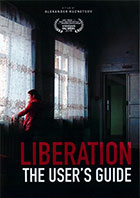
Liberation, The User’s Guide 2016
Distributed by Icarus Films, 32 Court St., 21st Floor, Brooklyn, NY 11201; 800-876-1710
Produced by Alexander Kuznetsov
Directed by Alexander Kuznetsov
DVD, color, 80 min., English and Russian with English subtitles
General Adult
Russian Federation, Psychiatric Care, Mental Illness, Orphanages
Date Entered: 01/18/2017
Reviewed by Andrew Jenks, California State University, Long BeachThis documentary follows the lives of two residents at the Tinskoi Psychoneurological Institute in Siberia over a number of years. Their story is a typical one: abandoned at birth, they lived in a series of orphanages, trapped in a system in which they have lived almost their entire lives and from which there is little hope of escape, even as adults. They suffer from anger, depression and anxiety, not so much as a result of their supposed illness but from a life of neglect beginning at birth and experienced throughout their lives as wards of a state which never gives them a chance to live independently.
The Russian psychiatric system in many ways reflects attitudes toward institutionalization in the United States in the 1970s and 1980s, before the focus shifted toward integrating individuals with various cognitive disabilities into the broader society and educational systems. As a result, those who would be considered highly functioning autistic, for example, would be able to attend schools, go to university and enter into the work force. In Russia, they remain institutionalized, treated as children and transformed, permanently, into wards of the state. One patient’s official, medical diagnosis is listed as “slight intellectual deficiency with behavioral problems” – certainly something that could apply to many people outside the institute. Their main deficiency, as this film makes clear, was the bad luck to be born to parents that did not want them and could not take care of them. Their abandonment as children then served as the primary motivation for the diagnosis of mental deficiency that provided the pretext for institutionalization.
The film opens by asking the patients – all young men and women – about their dreams. All of them say it is to leave and start up a life on their own, but they also add, tellingly, that they do not believe their dream will ever come true. The Russians like to say that, “hope is the last thing to die.” In this case, hope seems to have died.
To be in the institute also means being excluded from participation in Russian civic life. In Russian, the legal term is to be civically incapacitated, and the patients must apply for restoration of those rights. There is a formal process to allow for this – to go before a judge to establish one’s civil capacity -- but it sets impossible standards for realization. And without their capacity to function in civil life confirmed, they cannot marry, hold a job, or have children. What makes their situation even more heartbreaking is that there is a process by which they can formally apply to exit the institution – but it is nearly impossible, at least based on the evidence from the documentary, to go through it successfully.
The patients, before facing the judge, are a bundle of nerves. They try to console each other and to face their situation stoically. The judge’s decision, however, is to deny yet again the patient’s receipt of civil capacity. The original psychological report of mental deficiency, at least in the judge’s view, is permanently damning and stigmatizing. “I’m an unwanted child,” says one distraught resident, after being rejected by the judge. Four years later, she was still institutionalized, going up again for review to receive her civil capacity. Her rejected appeal is heartbreaking, though unexpectedly the other resident, Yulia, miraculously received her civil capacity after 11 years of applications as an adult.
No clear-cut objective criteria can explain why one patient was released and the other remained institutionalized; in the end, the judge, perhaps persuaded by the knowledge of being filmed, decided to buck the system and grant Yulia “civil capacity.” Watching this film, it seems apparent that the main obstacle to psychiatric health is the very profession of Russian psychiatry itself, supported and strengthened by the Russian legal system.